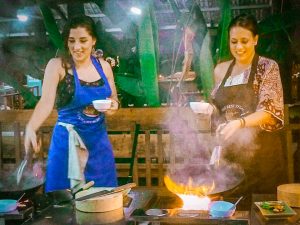Hey There!
I'm Reina
I am a full-time traveling registered nurse, fitness enthusiast, and nutrition expert. Every morning I wake up intending to bring awareness of the importance of health and spiritual wellness, especially to the traveling community. At Messy Bun Traveler, we promote travel that allows the traveler to either kick-start, maintain, or enhance a healthy lifestyle. So whether you're someone who travels for business, travels for pleasure, or new to travel and looking for health advice while on the road, this blog is for you!
inspiration
Categories:
health
destinations
fitness
resources
wellness
Privacy & Disclosure
The Messy Bun Traveler is designed to bring you fun stories, destination guides, and healthy travel advice. To help cover the cost of running this site, all posts are sprinkled with hand-selected affiliate links. When you click on one of these links and make a purchase, I will earn a small commission at no additional cost to you. I only accept affiliate links and paid advertisements from brands I believe in, trust and use personally. Thank you for your continued support!
The “No Excuse” Healthy Travel Guide: 15 Tips to Healthy Eating While on the Road
January 7, 2020
I frequently like to share my story and struggles in my blog posts. By doing so, I’m not just vomiting out empty words and impossible tasks but rather providing you with first-hand experience.
I hope, through my stories and road bumps, you see that I too struggled with healthy eating while living life on the road. But through trial and error, and MAJOR lifestyle changes, I found the secret recipe to living a better, healthier life while traveling. I believe everyone, with a little bit of effort, is capable of doing the same.
In my “12 Tips to Staying Fit While Traveling” post, and a few previous posts, I shared how I struggled with gaining unhealthy weight when I started traveling full time for work. It doesn’t take a genius to tell you that constantly moving without the guidance and discipline of routine makes it extremely difficult to stay healthy while traveling. Keeping up with physical activity can be difficult. Still, above all, our diets can go right out the window when we’re out on the road and away from the confinement of our refrigerators.
See also:
- The “No Excuse” Healthy Travel Guide: 12 Tips to Staying Fit While Traveling
- 8 Simple Ways to Get Back into Exercising After Vacation
While staying physically active is extremely important to health, so is our diet. In fact, the food we eat accounts for 80% of our energy levels, and even how we look and feel. If you talk to any personal trainer (fun fact, I’m currently taking classes to get my certifications in becoming a personal trainer!), they will tell you that 80-90 percent of getting healthy and STAYING healthy is based on what you consume in your diet. And they’re right. You can exercise for hours a day, but if you’re just re-fueling your body with junk, your efforts will not get you very far. You won’t feel too great, either.
Here is a list of common eating mistakes people make while traveling (and yes, I too am guilty of these):
1. Skipping out on a healthy breakfast.
A lot of the time, if we are traveling for work, we opt just to skip breakfast altogether to get those few extra minutes of sleep. While skipping breakfast isn’t recommended, and often leads to poor dietary choices or overeating, new studies are showing that the importance of breakfast is not necessarily WHEN you eat it but rather, WHAT you eat. A lot of the time, when we’re traveling, we’re eating what’s provided in a hotel’s continental breakfast. This includes a waffle maker station, perhaps some cereal and toast, muffins, coffee, and sugary fruit juices (a lot of the time aren’t even real juice!). We’re lucky if the hotel-provided breakfast offers eggs or even fresh fruit. My point is, although trips can sometimes be hectic, people need to start the day off with the right breakfast. Eating breakfast at a reasonable time during the day, as well as the QUALITY of the food you’re eating will help keep your metabolism running and stave off that bad cravings later.
2. Eating oversized portions.
Many times, when we’re traveling, we feel the need to indulge in three full-sized meals a day. This is largely because we’re frequently eating out, and restaurants tend to dish out large portion sizes. This leads to overeating as our body doesn’t need that many calories in one day. Generally, the right portion size is no larger than the size of your fist. Opt for a meal that has a fist full of protein, a fist full of veggies, and a fist full of whole grains. Many restaurants offer half-orders or even senior menus. Don’t be afraid to be picky! You can quickly shed calories off an entrée by asking the chef to hold the butter, or even use a fat-free dressing on your salad!
3. Not drinking enough water.
Another common mistake I see a lot of people make while traveling is that they don’t drink nearly enough water. Dehydration is a real thing, people! Also, your brain can mistake dehydration for hunger instead of thirst. A lot of times this leads to overeating and not drinking enough water. To fix the problem, when you think you’re feeling hungry, drink a tall glass of water first. Give it about 15-20 minutes, then see how you feel afterward. This is an easy trick to healthy eating while on the road.
4. Drinking too much alcohol.
Don’t think that you’re not allowed to treat yourself to a nice cocktail while traveling, but I do recommend limiting yourself. Alcohol is what’s considered as “empty calories” in that it has a high-calorie content but doesn’t add any nutritional value.
5. Indulging in all the wrong things.
A lot of the time, when we’re on a trip, we have the mindset of “I can do whatever I want – I’m on vacation!” and yes, while it’s good to treat yourself while you’re out traveling, just like the drinking, it shouldn’t be overkill. We should still be making sure we’re eating enough nutrient-dense foods, so we get all of the necessary vitamins and minerals we need.
If you’re looking for solid advice on how to eat healthy while on the road, this list here is an easy guide to follow. Remember, it’s not about being perfect. However, the more mindful we are with our eating, the better decisions we will make in the long run. Each healthy choice is a steppingstone in the right direction.
Here are 15 tips to healthy eating while on the road:
1. Always read the nutritional information
Sometimes you’ll be surprised at what you read. But in all honesty, one of the best things you can do to help stick to a healthy diet is to always read nutrition labels. Be especially mindful of the calorie count, saturated fats, sugars, and carbohydrates!
2. Watch out for hidden calories in dressings and sauces
Sometimes we don’t account for the calories in dipping sauces and salad dressings when in reality, that’s where most of the calories are sometimes! If you’re eating a salad with a heavy, high-fat dressing, you may be consuming more calories than a double-decker cheeseburger and not even realize it! My recommendation, be mindful of the calorie count in all sauces and dressings and ask for low calorie or fat-free alternatives whenever you can!
3. Sign up for a subscription box
One thing I love to do while I’m traveling for work and feel like I don’t have the time to prepare healthy food is order a food subscription box. I order from Sunbasket because I know all the ingredients are fresh, organic, and the recipes are healthy. Additionally, there are many different categories you can choose your food from, including low-calorie, paleo, vegan, gluten or dairy-free, diabetic-friendly, and more!
4. Majority of your meals should be protein and veggies
Proteins and vegetables will keep you full longer because they take longer to be digested in the body. Plus, they contain many vitamins and minerals to help you feel good and well energized!
5. Eat carbohydrates in moderation
Eating carbohydrate-dense meals will leave you feeling high with an energy crash later on in the day. Plus, any carbohydrates your body doesn’t use up for energy gets stored as fat and can be even harder to process later!
6. Be mindful of portion sizes
As mentioned earlier, generally, portion sizes should be no bigger than the size of your fist. If we’re not cognizant of our portion sizes, it’s very easy to over-eat.

Always carry a water bottle with you!
7. Carry a water bottle everywhere you go
Carry a refillable water bottle with you to avoid dehydration. Dehydration can easily be mistaken for hunger, causing us to overeat. Plus, our energy levels deplete once our bodies are starving for water.
8. Pack nutrient-dense, high protein snacks
It’s best to consume small, frequent meals throughout the day to keep energy levels up. If you’re looking for inspiration on the best travel snacks, check out my list of my 25 favorite healthy travel snacks here.
9. Plan your meals in advance
A little planning can go a long way. If you know what area you’re going to be in, do your research in advice with a quick google search. Pick out your restaurants that you know have healthy food options in advance.
See also:

Eating healthy on the road can simply mean to just cook your own meals!
10. Cook your own meals
You don’t need to be dining out every evening. Instead, opt for a home-cooked meal by buying fresh produce at the grocery store, and preparing it at the hotel or Airbnb. Many locations offer either kitchens in the hotel rooms or a community kitchen for all guests to use!
11. Pick a “wellness” hotel
I shared in Wellness Tourism: How Wellness is Changing the Way we Travel, that many hotels are incorporating health and wellness into their branding and marketing strategies to appeal to the millennial generation (a generation that values health). Picking a hotel that focused on putting “wellness” services into the hotel will most likely provide better continental breakfast options, healthy room service food selections, and in-house fitness rooms.
12. Don’t wait until you’re too hungry to eat
Waiting until you’re dying of hunger can make it tempting to indulge in whatever the next food you see is. A lot of the time, this consists of junk food and unhealthy choices.
13. Drink alcohol in moderation, stay away from sugary drinks
Be mindful of all those empty calories!
14. Always carry hand sanitizer
I added this point to healthy eating because the number one prevention in food poisoning is proper hand hygiene. Before you indulge in your next meal, make sure to wash your hands with warm water and soap. Of course, if none is available during your travels, it’s always handy to have sanitizer available.
See also:
15. Don’t beat yourself up for not being perfect
And lastly, don’t beat yourself up for not being perfect. You’re on vacation to have fun, not always worry about what you’re eating. By just giving it some effort and taking those baby steps will set you off in the right direction. Remember, habits aren’t something that form overnight. But making a conscientious effort to healthy eating while on the road will set you on the path to success!
See also:
If you found this post useful, please pin me!
Join my newsletter
* We will never share your details with any third party
